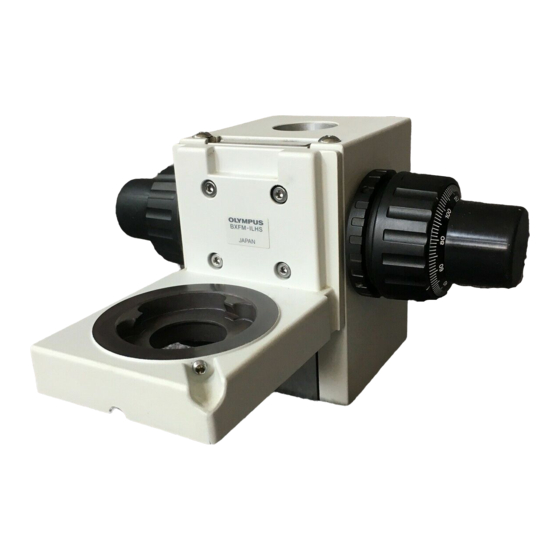- ページ 17
顕微鏡 Olympus BXFM-ILHSのPDF 取扱説明書をオンラインで閲覧またはダウンロードできます。Olympus BXFM-ILHS 36 ページ。 Focusing unit

OBSERVATION METHODS (Using U-KMAS)
}For the observation methods of the BX-URA2 and BX-RLA2 reflected light illuminators, refer to their instruction manuals.
5-1 Reflected Light Brightfield Observation
See "REFLECTED LIGHT BRIGHTFIELD OBSERVATION PROCEDURE" on page 7.
5-2 Reflected Light Nomarski DIC (Differential Interference Contrast) Observation
# The performance of polarizer may deteriorate when it has been exposed to light for a long period (about continu-
ous 2000 hours). If this happens, replace the polarizer.
# When performing sensitive color observation using the U-DICRH DIC slider, combine the U-POTP3 polarizer.
# When using the high-intensity light source, be sure to use the U-25L42 filter to prevent the polarizer from being
burnt.
@
Fig. 16
ƒ
|
...
Fig. 17
1
Setting the Analyzer and Polarizer
# In the current step, do not engage the DIC slider in the light path.
1. Bring the specimen in approximate focusing using the 10X or 20X objec-
tive.
2. Remove the cover to enable installation of the U-AN360-3 analyzer. Then
put the analyzer @ in the insertion slot.
²
3. Insert the U-PO3 or U-POTP3 polarizer ² so that the surface with indica-
tion comes on the front, and engage the polarizer in the light path.
³
4. Rotate the analyzer rotating dial ³ to find the position where the field of
view is darkest.
}An approximate cross-Nicol position can be obtained by setting the in-
dex on the dial ³ on the outer side. Fine-adjust the dial by rotating it near
this position to find the position where the field of view is darkest.
Using the Joint Plate
When the U-AN360-3 analyzer ƒ and U-PO3 or U-POTP3 polarizer ... are
coupled by using the joint plate | provided with the polarizer and tight-
ening the clamping knobs on it, the analyzer and polarizer can be en-
gaged or disengaged in the light path together.
BXFM
(Fig. 16)
14
